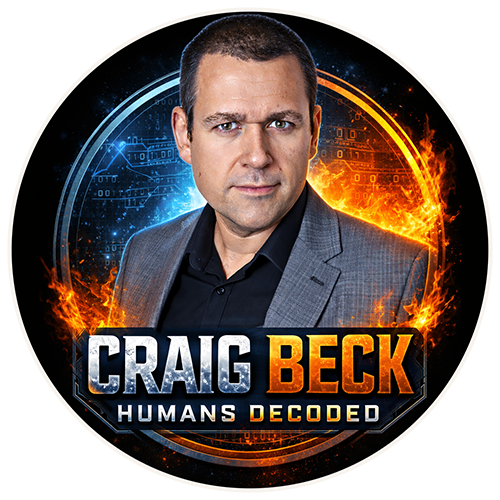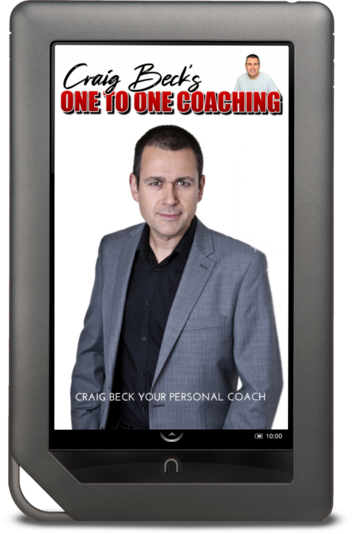Understanding Anxiety: Types, Symptoms, and Treatments
May 02, 2023
Understanding Anxiety: Types, Symptoms, and Treatments
Anxiety is a natural human emotion, and experiencing it occasionally is normal. However, anxiety can become overwhelming, persistent, and even debilitating for some individuals.
This article will provide an overview of the different types of anxiety, their symptoms, and various treatment options, ultimately helping you understand how the book "Anxiety Lied To Me" and the online coaching program at www.craigbeck.com can support you in overcoming anxiety.
Types of Anxiety Disorders
There are several types of anxiety disorders, each with unique characteristics. Some of the most common include:
- Generalized Anxiety Disorder (GAD): Characterized by chronic, excessive worry about everyday events and activities. People with GAD often find it difficult to control their anxiety and may experience symptoms such as restlessness, irritability, and difficulty concentrating.
- Panic Disorder: People with panic disorder experience recurrent panic attacks, which are sudden, intense feelings of fear accompanied by physical symptoms such as a pounding heart, shortness of breath, and dizziness.
- Social Anxiety Disorder: Social phobia involves a persistent fear of social situations in which others may scrutinize or judge the individual. It can lead to avoidance of social situations, negatively impacting daily functioning and relationships.
- Specific Phobias: Intense, irrational fears of specific objects or situations, such as heights, spiders, or flying. These fears often lead to avoidance behaviors and can significantly impact daily life.
- Obsessive-Compulsive Disorder (OCD): Characterized by persistent, unwanted thoughts (obsessions) and repetitive behaviors (compulsions) that the individual feels compelled to perform to reduce anxiety.
- Post-Traumatic Stress Disorder (PTSD): This disorder can develop after experiencing a traumatic event, such as a natural disaster, accident, or assault. Symptoms include flashbacks, nightmares, and heightened anxiety, particularly in situations that remind the individual of the trauma.
Symptoms of Anxiety
While symptoms can vary depending on the specific anxiety disorder, some common signs include:
- Excessive worry or fear
- Restlessness or feeling on edge
- Difficulty concentrating
- Irritability
- Muscle tension
- Sleep disturbances
- Fatigue
- Rapid heartbeat or shortness of breath
- Dizziness or lightheadedness
- Sweating or trembling
- Gastrointestinal issues
Treatments for Anxiety Disorders
There are various treatment options available for anxiety disorders, and the most effective approach often involves a combination of therapies tailored to the individual's needs. Some common treatment methods include:
- Psychotherapy: Cognitive-behavioral therapy (CBT) is one of the most effective forms of psychotherapy for treating anxiety disorders. It focuses on identifying and challenging negative thought patterns and developing coping strategies for managing anxiety symptoms.
- Medications: Selective serotonin reuptake inhibitors (SSRIs) and benzodiazepines are commonly prescribed to help manage anxiety symptoms. Working closely with a healthcare professional to find the most suitable medication and dosage is essential.
- Lifestyle changes: Regular exercise, a balanced diet, and sufficient sleep can positively impact overall mental health and help alleviate anxiety symptoms.
- Relaxation techniques: Mindfulness meditation, deep breathing exercises, and progressive muscle relaxation can help reduce anxiety and promote a sense of calm.
- Support groups: Joining a support group can provide a safe space to share experiences and learn from others dealing with anxiety.
Conclusion
Understanding the different types of anxiety, their symptoms, and available treatments is the first step towards regaining control of your life. The book "Anxiety Lied To Me" and the online coaching program at www.craigbeck.com offer valuable resources and guidance for overcoming anxiety. Combining expert advice, practical strategies, and personal experiences will empower you to face your fears and start living a happier, more fulfilling life.
Remember that recovery is a journey, and you must be patient with yourself as you learn to manage your anxiety. Reach out for support from friends, family, or a mental health professional, and consider exploring a range of treatment options to find the most effective approach for your unique needs. As you gain a deeper understanding of your anxiety and develop coping skills, you'll be well on your way to overcoming the challenges that once seemed insurmountable.
Take the first step today by exploring the resources available through "Anxiety Lied To Me" and the online coaching program at www.craigbeck.com. With the right support and determination, you can break free from the grip of anxiety and rediscover life's joy and peace.




